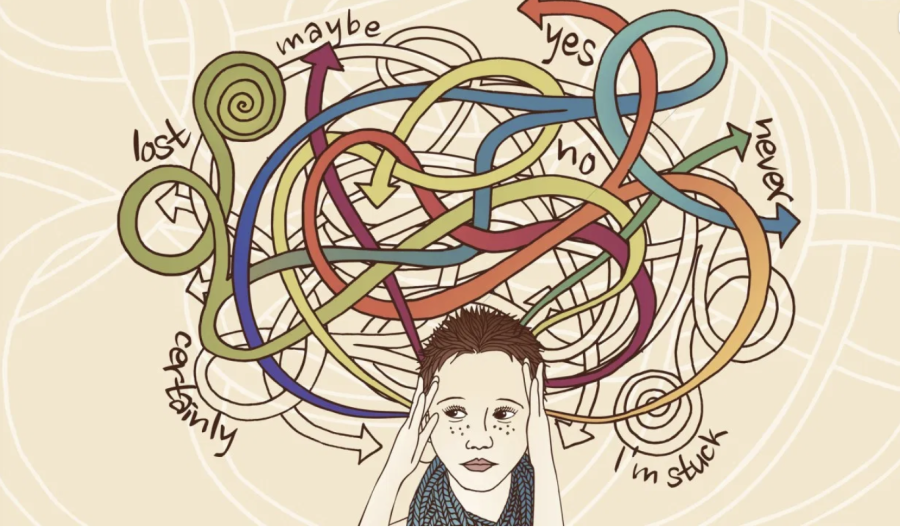ADHD, Not a Personality Quirk!
With more studies taking place, diagnosing ADHD in students has changed.
Often, teens grow up seeing particular traits in them that they don’t associate with the ‘normal’ way a person is supposed to act. They experience things like executive dysfunction, hyperactivity, and forgetfulness, and ask themselves, ‘what’s wrong with me?’
The difficulty with identifying Attention Deficit Hyperactivity Disorder, for many, ties with its symptoms. A great deal of the common public view it as just fidgeting and trouble focusing on tasks, when those two traits alone could be related to a variety of things, including simply temporary hormonal changes. Symptoms of BPD (Bipolar Disorder), ODD (Oppositional Defiant Disorder), and autism cross paths with ADHD in many instances, making it easy for people to incorrectly self-diagnose themselves.
Where many go wrong, though, is in not attempting to find a diagnosis at all. When going their whole life undiagnosed, it is easy for people, particularly parents, to write symptoms off, especially things like difficulty with math, being pushy, and poor impulse control. Student support counselor, Lori Cook, believes the problems with both self-diagnosis and no diagnosis at all lie with not just the teen but their parents too.
“So many times whenever kids can’t focus in class they say, ‘Do I have ADHD?’ So they self diagnose more than actually going out and getting a diagnosis. And parents do the same thing, so that’s where the lack of education comes into play. A lot of times it’s parents that don’t want to know what’s going on with their kid. Like, some parents don’t want to medicate when with ADHD, it’s a medication issue. If you find that your kid is struggling, and there are a lot of ADHD issues there, you take them and they get diagnosed and if what can help with that is medication then why would you not want your kid to be successful?” said Cook.
For some parents, it’s easy to think that their child will grow out of the behavioral issues that come with ADHD when that’s not really the case. While a few people’s behavior is not related to the disorder at all, and they do indeed get better with time, people with ADHD usually have it their whole life and seldom simply ‘grow out’ of it. Freshman, Psalm Haynes, has experience with similar symptoms and at times has struggled to maintain focus.
“Sometimes, you like, start daydreaming and it’s just like all of a sudden you come back later in class. Sometimes, you’ll just get really odd, weird flashes of energy and you don’t know what to do with it, so, you just start either talking really fast or shaking your leg or something like that. Sometimes it can be really hard to focus but I’ve gotten used to it,” said Haynes.
For most people experiencing such things, it’s difficult to really be understood and heard. The common saying, ‘It’s all in your head,’ is a constant, nagging whisper in the back of their minds when they don’t have an answer to their problems, a reason behind the issues in themselves that they can get convinced aren’t real. When they come across this mindset, it may be difficult to break through it and say, ‘This is what is happening in my brain, and I’m not imagining it. Please listen to me. Please help me.’ Not very many people without ADHD are able to sympathize with those who struggle with it. Sophomore, Giordana Calderin, has worked hard to overcome challenges she has faced and feels that the necessary education on the topic would help her feel more understood.
“It definitely still affects me now, though, especially when I have to study for an important exam and focus on something specific. I find it really hard and sometimes I feel like I have to put in more effort than what ‘normal’ people would. It’s not really something I can do much about but it would be nice to sometimes have teachers and friends understand it a little better so that I don’t feel like I’m overreacting in a way,” Calderin said.
Although the validation of their teachers and peers aren’t the main concern of people with ADHD, it is valid for them to want it and difficult for them to be understood. They can present hyperactivity, a common symptom, and have little awareness or control over it, since awareness is also something many ADHDers struggle with.
What many fail to consider is that ADHD is an actual disorder in which the brain is quite literally low in function in four regions. The science behind ADHD receives little attention, making it more common for people to believe it’s just a quirky personality trait people use as an excuse for their behavior. What they have to understand, though, is that the behavior stems from the low dopamine and norepinephrine levels of the ADHD brain. Their brains are different from neurotypical ones, and that can be where many of the misconceptions of ADHD come from. While it is easy to process going from Point A to Point B for neurotypical brains, for people with ADHD there are a dozen different ideas, thoughts, and sub-ideas pinging inside their head all at once, before they are even able to come near a conclusion. At all times the brain is scrambling with thoughts, even when the person presents a cool, calm front, although many would agree that it is definitely harder when they experience hyperactivity mentally and physically. Sophomore Abby Mincer has time and time again gotten frustrated after being told she needs to ‘just calm down’ or ‘chill’ by people who make no attempt to learn about the intricacies of the disorder.
“People think it’s a personality disorder or something you’re faking or that we’re crazy. Like, if we do certain things we’re labeled crazy because of the way we act, and I don’t think that’s right. It is something that can be very difficult to deal with, as a person. It can cause other mental issues and certain medication for it can even cause eating disorders, or in some cases, actual personality disorders. Some people just don’t understand that you think about so many things at once, that you’re doing so many things at once,” said Mincer. “People need to be aware of what people struggle with when it comes to ADHD, like their mental and even physical process.”
Since approximately over 6 million people have ADHD, it is something that can easily be brushed aside by both neurodiverse and neurotypical people. But with more education on the topic, more people can be informed on the daily struggles of teens with Attention Deficit Hyperactivity Disorder and make it easier for them to vocalize and manage their feelings in a community where they feel heard.


